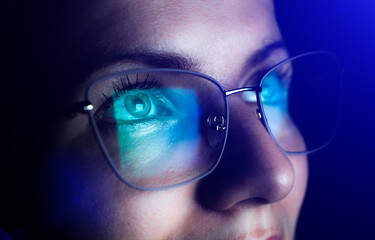
In today's digital era, we are surrounded by screens, from smartphones and tablets to computers and televisions. While these devices provide convenience and entertainment, they also emit blue light, which is next to ultraviolet (UV) rays on the wavelength spectrum. Without a doubt, UV rays can harm the eye, but can blue light harm the eye as well? And if so, can we just block the blue light from entering the eye? We’ve all heard of blue light filters before, but do they actually work? The short answer is… not necessarily. In this blog post, we will explore the concept of blue light filters, how blue light can affect you, and practical solutions to everyday issues that arise.

Understanding Blue Light:
Blue light is a high-energy light within the visible light spectrum. It is emitted by the sun, but it is also produced by various artificial light sources, including digital screens. While blue light is essential for regulating our sleep-wake cycle and boosting mood and alertness during the day, can overexposure to blue light have negative effects on our eyes and overall well-being?
The Role of Blue Light Filters:
Blue light filters, also known as blue light blocking lenses or coatings, are designed to reduce the amount of blue light that reaches your eyes. These filters work by selectively blocking or absorbing blue light while allowing other beneficial wavelengths to pass through. Blue light filter glasses have lenses that are specifically designed to block or absorb a significant portion of blue light. These glasses can be worn as prescription glasses, non-prescription glasses, or as specialized computer glasses for extended screen use.

Potential Effects of Blue Light:
Digital Eye Strain: It is commonly thought that prolonged exposure to digital screens can lead to a condition known as digital eye strain or computer vision syndrome. Symptoms include dry eyes, eye fatigue, blurred vision, and headaches. But these same symptoms can also be caused by the large increase of near demand we put our visual system through in this digital age.
Disruption of Sleep Patterns: Blue light can interfere with the production of melatonin, a hormone that regulates our sleep-wake cycle. Overexposure to blue light in the evening can disrupt our natural sleep patterns, making it harder to fall asleep and obtain quality rest.
Potential Retinal Damage: Recent studies suggest that long-term exposure to blue light may potentially contribute to retinal damage, potentially increasing the risk of age-related macular degeneration (AMD) later in life. However, it must be noted that the amount of blue light that we are exposed to by digital devices every day is a fraction of a percent that we’re exposed to naturally by the sun. Currently, more research is needed to fully understand the extent of this risk.
While the concept of blue light filter glasses may seem appealing, it's important to recognize that their effectiveness in mitigating the potential harms of blue light is still a subject of debate. Research studies have produced conflicting results, with some suggesting minimal benefits, while others question their overall effectiveness. Instead of relying solely on blue light filter glasses, it is crucial to adopt a holistic approach to eye health and screen use. Practicing healthy screen habits such as the 20/20/20 rule (every 20 minutes, look 20 feet away for 20 seconds), adjusting screen brightness, and maintaining proper posture, can have a more significant impact on reducing digital eye strain. Additionally, incorporating other measures like using a lens made for digital use, night mode settings on devices, limiting screen time before bedtime, and maintaining overall eye health through regular eye exams can also contribute to long-term eye wellness.
Ultimately, the decision to invest in blue light filter glasses should be based on individual preferences and needs. Consulting with an eye care professional can provide personalized guidance and recommendations tailored to your specific circumstances. At Sight To See Eyecare & Eyewear, our dedicated team is committed to helping you make informed choices for your eye health and finding the most suitable solutions for your visual comfort.
Remember, finding the right balance between screen time, adopting healthy habits, and seeking professional advice are essential steps toward maintaining optimal eye health in the digital age.






